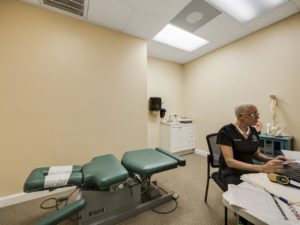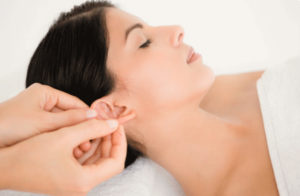Chiropractic Therapy
 A complete system of healthcare focused on restoring, preserving, and optimizing health by natural hands-on care. Where western medicine focuses on curing illness through surgery and pharmaceuticals, the goal of Chiropractic is to optimize health with a noninvasive approach that does not use drugs or surgery. Chiropractic’s primary avenue of care is correcting spinal subluxations. Substance use disorders, trauma disorders, compulsive and behavioral disorders are often found in people who have spinal subluxations. Research published in Molecular Psychiatry showed dramatically increased success rates of up to ninety-seven percent for detoxification as well as reduced anxiety, depression, cravings and less need for strong pain relief and psychiatric drugs by correcting spinal subluxations.
A complete system of healthcare focused on restoring, preserving, and optimizing health by natural hands-on care. Where western medicine focuses on curing illness through surgery and pharmaceuticals, the goal of Chiropractic is to optimize health with a noninvasive approach that does not use drugs or surgery. Chiropractic’s primary avenue of care is correcting spinal subluxations. Substance use disorders, trauma disorders, compulsive and behavioral disorders are often found in people who have spinal subluxations. Research published in Molecular Psychiatry showed dramatically increased success rates of up to ninety-seven percent for detoxification as well as reduced anxiety, depression, cravings and less need for strong pain relief and psychiatric drugs by correcting spinal subluxations.
Chiropractic Research
- Research published in Molecular Psychiatry showed dramatically increased success rates for drug detoxification.
- Reduced anxiety, depression, cravings.
- Less need for strong pain relief and psychiatric drugs by correcting spinal subluxations.
In an 18-month Chiropractic study:
- 100% of the Active Care group completed the 28-day treatment model, while only 56% of the Usual Care Group completed the 28 days.
- At four weeks, the Active Care group showed a significant decrease in anxiety (Spielberger State Anxiety score).
- Among the Active Group, only 9% made one or more visits to the nursing station, while 56% of the Placebo group and 48% of the Usual Care Group visited the nursing station.
Massage Therapy
Incorporating massage into a substance abuse program is advantageous in all of the stages of quitting an addiction: withdrawal, detoxification and abstinence. The physical, emotional and spiritual components of recovery all can be directly benefited by the healing power of therapeutic touch. Our masseuses are specially trained to use massage therapy for pain, relaxation, inner peace, anxiety and wellbeing.
Massage Therapy Research
- In 1998, the Touch Research Institute published the findings that a regular massage regimen produced long-term results of increasing dopamine levels. The fact that massage naturally increases dopamine levels, and decreases cortisol levels makes it a perfect addition to a standard detoxification program.
- Research continues to show enormous healing and therapeutic benefits of touch. Massage therapy is becoming a more integral part of healing in recovery treatment programs.
Numerous studies indicate that massage therapy helps relieve depression and anxiety. It has lowered levels of Cortisol by up to 50 percent, and increased levels of neurotransmitters that help reduce depression.
- A review of more than a dozen studies concluded that massage therapy helps relieve depression and anxiety by affecting the body’s biochemistry.
Researchers at the University Of Miami School Of Medicine reviewed studies that measured the stress hormone cortisol in participants before and immediately after massage and found that the therapy lowered levels by up to 53 percent. Massage also increased serotonin and dopamine, which are both neurotransmitters that help reduce depression.
Auriculotherapy
 Similar to ear acupuncture but uses no needles. At the Shores Treatment and Recovery we use a micro-current stimulator is placed on the reflex points on the outside of the ear. These points then send a message to the brain based on the location of the reflex points being treated. With this system, we are able to directly treat a number of problems and conditions related to substance use, trauma, compulsive and behavioral disorders such as anxiety, depression and cravings. It is also an effective way to stop smoking. Research demonstrates better retention rates in substance use centers up to ninety-seven percent with the use of Auriculotherapy.
Similar to ear acupuncture but uses no needles. At the Shores Treatment and Recovery we use a micro-current stimulator is placed on the reflex points on the outside of the ear. These points then send a message to the brain based on the location of the reflex points being treated. With this system, we are able to directly treat a number of problems and conditions related to substance use, trauma, compulsive and behavioral disorders such as anxiety, depression and cravings. It is also an effective way to stop smoking. Research demonstrates better retention rates in substance use centers up to ninety-seven percent with the use of Auriculotherapy.
Auriculotherapy Research
Two separate randomized studies, 3 years apart: Auriculotherapy vs. a capsule placebo control group, carried out in a residential treatment setting.
- Research demonstrates better retention rates in drug rehabilitation up to 97 percent with the use of Auriculotherapy.
Research demonstrates an 80 percent decrease in anxiety, depression and cravings in those with substance use disorders, compulsive and impulsive disorders.
Acupuncture
Acupuncture is arguably one of the most popular alternative medical treatments that has been practiced for thousands of years. Over the last couple decades this practice has shown tremendous benefits with helping to treat individuals suffering from drug and alcohol addictions, and mental illnesses. Acupuncture brings both physical and emotional relief to those suffering from both acute and chronic conditions. It has been extremely helpful for those with substance use disorders, eating disorders, trauma, compulsive and behavioral disorders. Our clients see many benefits of acupuncture including a decrease in cravings, anxiety, depression and pain. Mental clarity, better sleep and increase in peace and a sense of overall well-being are other benefits of acupuncture. This is because acupuncture helps to balance the body’s natural flow of energy.
Acupuncture Research
- Strong evidence for the effect of the NADA protocol in improving patient outcomes in terms of program retention, reductions in cravings, anxiety, sleep disturbance and need for pharmaceuticals.
- Evidence also continues to grow for the use of the NADA protocol in psychiatric/behavioral health care, humanitarian aid/trauma, as well as cancer care.
More than 2,000 drug and alcohol treatment programs in the U.S. and 40 other countries have added ear acupuncture (Auricular therapy) to their protocol.








